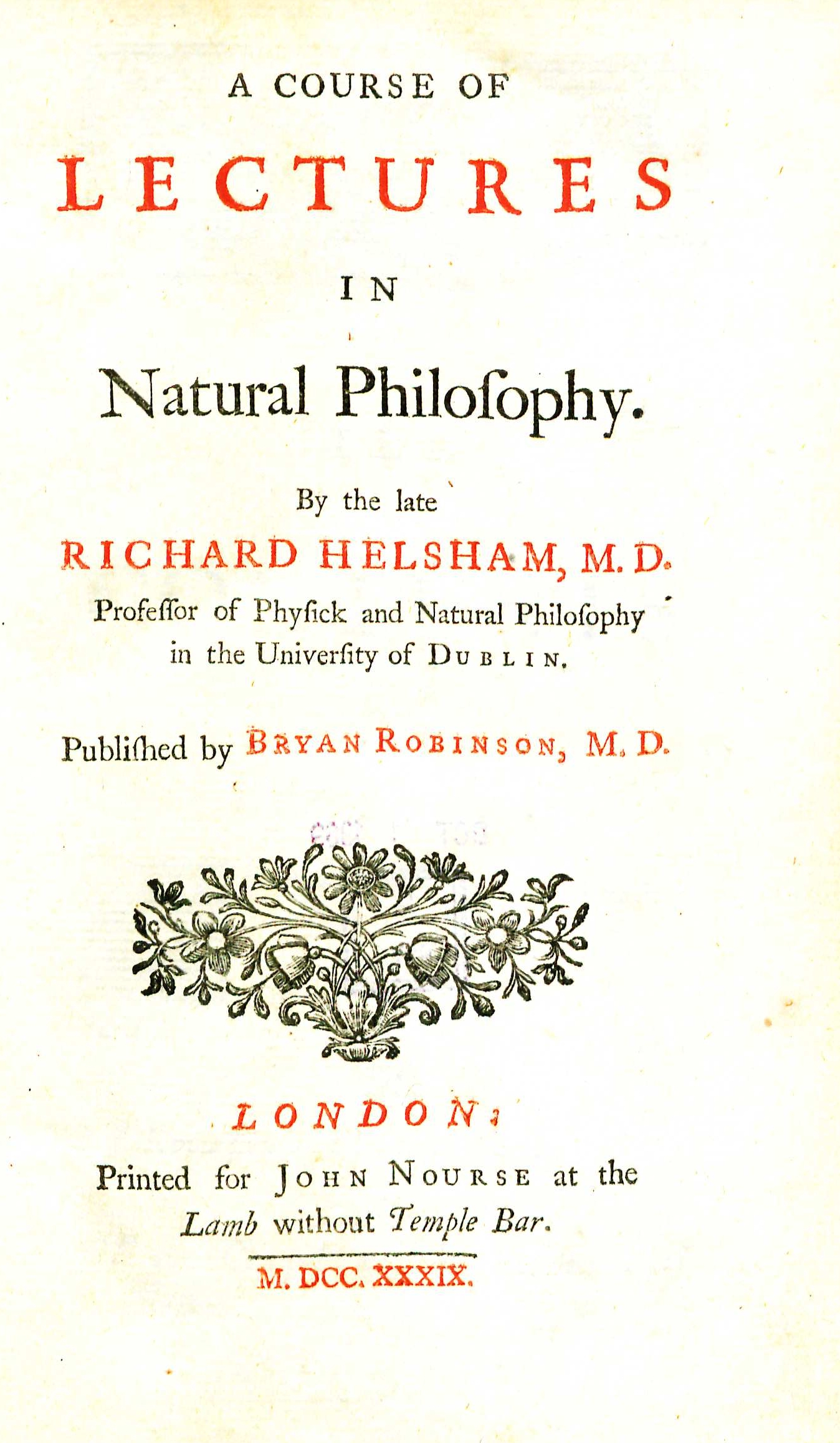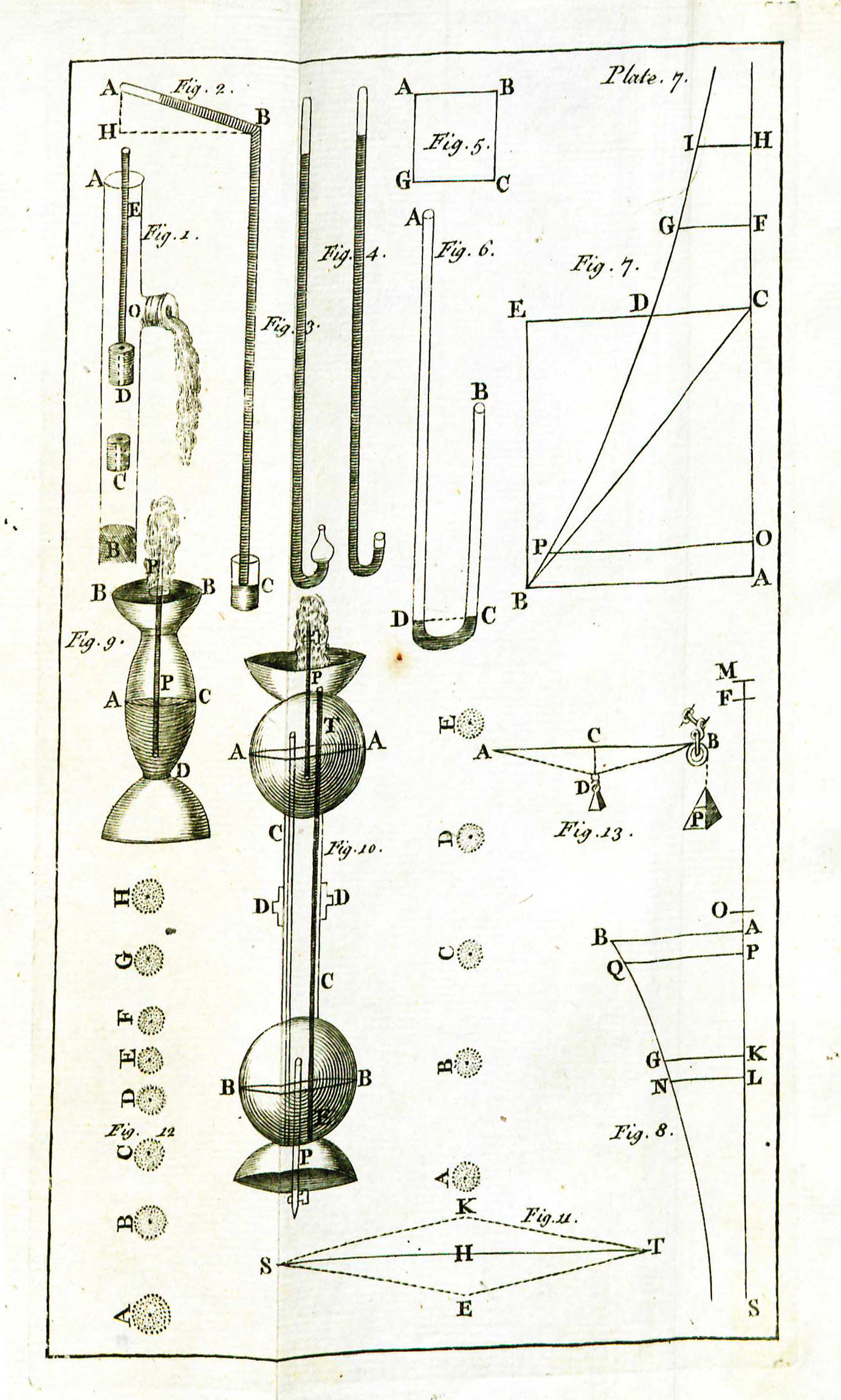Difference between revisions of "Course of Lectures in Natural Philosophy"
(→See also) |
|||
| Line 30: | Line 30: | ||
==See also== | ==See also== | ||
*[[George Wythe Room]] | *[[George Wythe Room]] | ||
| − | *[[Wythe | + | *[[Wythe's Library]] |
==References== | ==References== | ||
Revision as of 06:19, 6 July 2015
by Richard Helsham
| A Course of Lectures in Natural Philosophy | |
|
Title page from A Course of Lectures in Natural Philosophy, George Wythe Collection, Wolf Law Library, College of William & Mary. | |
| Author | Richard Helsham |
| Published | London: Published by Bryan Robinson, printed by J. Nourse |
| Date | 1739 |
| Edition | First |
| Language | English |
| Pages | viii, 404 : 11 folded plates |
| Desc. | 8vo. (21 cm.) |
| Location | Shelf N-4 |
Richard Helsham (1683–1738), physician and natural philosopher, was born outside of Kilkenny, Ireland. After attending the University in his hometown, Helsham left to advance his education, eventually receiving a medical degree and a formal appointment at Trinity College, Dublin. Here as the college's first professor of natural philosophy,[1] he worked for eight years to create one of the first ever institutionalized science laboratories and courses of study.[2]
Inspired by Descartes, and more directly Newton, Helsham's A Course of Lectures in Natural Philosophy covers a broad range of topics, as well as the nature of causation and experimentation in the sciences.[3] Edited posthumously by Bryan Robinson, a former student and colleague, "it was one of the earliest textbooks to present the scientific discoveries of Bacon, Descartes, Boyle, and Newton to university students in an understandable manner."[4] The volume is divided into twenty-three chapters that discuss the physics of light, color, sound, motion, friction, and simple machines such as pulleys and levers.[5] "The book had an enduring popularity"[6] and was well-known as one of the most comprehensive discourses on the subject of natural philosophy until years later when the term “scientist” would enter the public vernacular and inspire a series of texts on similar subjects extending their focus into the more complex physics that would drive the industrial revolution.[7]
Evidence for Inclusion in Wythe's Library
Listed in the Jefferson Inventory of Wythe's Library as "Helsham’s lectures. 8vo." and given by Thomas Jefferson to his grandson Thomas Jefferson Randolph. The precise edition owned by Wythe is unknown. George Wythe's Library[8] on LibraryThing indicates this, adding "Several octavo editions were published, the first in 1739." The Brown Bibliography[9] lists the London 3rd edition published in 1755 based on the copy Jefferson sold to the Library of Congress.[10] The Wolf Law Library chose to purchase the first (1739) edition.
Description of the Wolf Law Library's copy
Full bound in contemporary etched calf with a red morocco spine label and compartments tooled in gold. Purchased from Black Swan Books, Inc.
View the record for this book in William & Mary's online catalog.
See also
References
- ↑ H. T. Welch, "Helsham, Richard (1683–1738)’" in Oxford Dictionary of National Biography (Oxford University Press, 2004- ), accessed Oct. 6, 2013.
- ↑ Ask About Ireland, s.v. "Helsham, Richard," accessed Oct. 5, 2013.
- ↑ Richard Helsham, A Course of Lectures in Natural Philosophy, 4th ed., ed. Bryan Robinson, M.D. (London: Printed for J. Nourse, 1767).
- ↑ Welch, "Helsham, Richard."
- ↑ Helsham, A Course of Lectures in Natural Philosophy
- ↑ Welch, "Helsham, Richard."
- ↑ Laura Snyder, The Philosophical Breakfast Club (TED, 2012).
- ↑ LibraryThing, s.v. "Member: George Wythe", accessed on November 13, 2013.
- ↑ Bennie Brown, "The Library of George Wythe of Williamsburg and Richmond," (unpublished manuscript, May, 2012) Microsoft Word file. Earlier edition available at: https://digitalarchive.wm.edu/handle/10288/13433
- ↑ E. Millicent Sowerby, Catalogue of the Library of Thomas Jefferson, 2nd ed. (Charlottesville: University Press of Virginia, 1983), 4:35 [no.3736].
External Links
Read this book in Google Books.

